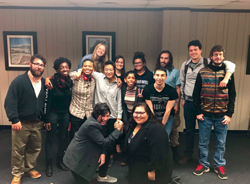Priscilla Gac-Artigas, Ph.D., Professor of Spanish and Latin American Literature in the Department of World Languages and Cultures, recently published an article in ViceVersa Magazine about late Supreme Court Justice Ruth Bader Ginsburg.
The article, titled “Our Pledge to Ruth Bader Ginsburg,” begins with a personal anecdote, includes a discussion as to how the Judge’s death became politicized, and explains the impact Ginsburg’s seat in the Supreme Court can have on future generations.
She concludes the piece with a call to action for readers to fight for justice and equality to honor Ginsburg’s memory. She dedicated the article to her daughter, granddaughters and daughter-in-law.
“It was not only a desire, but a need, to write the piece,” said Gac-Artigas. “What inspired me to write this piece was the desire to protect and to advocate for the selection of a Judge that will apply justice the way [Ruth Bader Ginsburg] did it—a color, class, gender blind, unbiased justice with the interest of the ‘less fortunate’ in mind, and not thinking of political gains”.
She continued, “What prompted me to write it was the indignation for what Democrats and Republicans made of it, each one trying to gain political benefit from it, not really thinking on what a Judge of the Supreme Court should be.”
Gac-Artigas wrote the piece in both Spanish and English, since her message was intended for both communities. “The impact that RBG’s death can have in our society will affect all of us not only a particular group and the only thing that can help us will be to present a united front,” she said. “It is a matter of pride to write in Spanish and to show younger generations of Hispanics the importance of being bilingual, of keeping alive your heritage language and culture.”
Not only is it a sense of pride, but, “The Hispanic population represents 18 percent of the population of the US,” she said. “Nevertheless, its degree of representation in the economic, social and political life does not correspond to that percentage.”
She continued, “If we want things to change, we need to present a unified front with a clear agenda—and that agenda needs to include the demand of rights for the DREAMERS, and for the 11 million undocumented immigrants, most of them living, working and paying taxes in the US for more than 20 or 30 years.”
Gac-Artigas believes that Americans need to support the election of local, regional and national officials with values like Ginsburg’s in order to create change.
“As a woman and committed advocate for all human rights, I knew that I should speak out; not doing it would have been cowardice,” she said.
Gac-Artigas has contributed to ViceVersa Magazine since 2017, which is a publication that promotes Latin American talent and excellence, according to the magazine’s LinkedIn page.
Other articles she has written for the magazine cover literature, politics and culture, which relates to the courses she teaches at Monmouth University.
“I always try to instill in my students the respect of others and the importance of speaking against racism, discrimination, or any kind of injustice, and standing for their rights,” she said.
Alumna Michelle Iannelli ’20, who majored in Spanish, took various courses with Gac-Artigas. “She is one of the most provoking professors and she is so passionate about what she teaches, in hopes that it will rub off on her students,” said Iannelli. “I feel like I became a more well-rounded, better individual who elaborately thinks about the problems of other people in the world.”
Another former student of Gac-Artigas who majored in Spanish, Karla Avila ‘20, felt honored to learn from her. Avila said, “For me, Dr. Gac-Artigas represents hard work, dedication, respect, and passion for her work…[she] encourages future generations like myself and the ones that will come after to create change.”
This semester, Gac-Artigas is on sabbatical working on two different projects. The first one is a comprehensive journal article and the second one focuses on literature.
The message Gac-Artigas wants to convey is the need to stay alert and be ready to defend human rights for future generations. “That is what RBG would expect from us,” she said. “That is what we should do not only to honor her memory if we really cared for her, but for the sake of humanity.”
PHOTO COURTESY of Monmouth University




